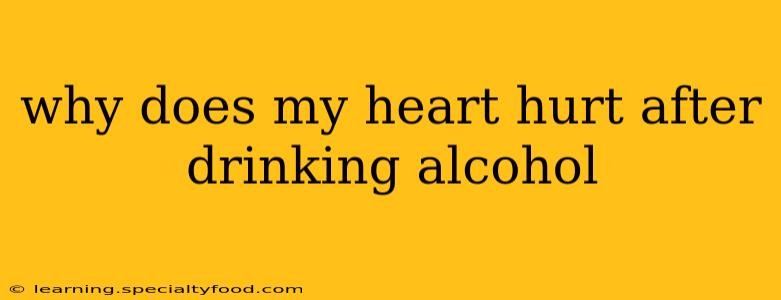Experiencing heart pain after alcohol consumption can be alarming, and it's crucial to understand the potential causes. While a mild, temporary discomfort might not always be cause for serious concern, persistent or severe pain demands immediate medical attention. This comprehensive guide explores the various reasons why your heart might hurt after drinking alcohol, offering insights into both common and less frequent explanations.
Can Alcohol Directly Affect the Heart?
Yes, alcohol can directly impact your heart in several ways, both acutely (immediately after drinking) and chronically (with long-term, heavy consumption). Acute effects can range from increased heart rate (tachycardia) and palpitations to more serious conditions. Chronic heavy drinking can lead to significant heart damage.
Increased Heart Rate and Palpitations:
Alcohol is a central nervous system depressant, but paradoxically, it can initially stimulate the heart, causing your heart rate to increase and leading to noticeable palpitations. This effect is often more pronounced in individuals who are not regular drinkers or those consuming alcohol rapidly.
Cardiomyopathy:
Chronic heavy alcohol abuse is a significant risk factor for developing cardiomyopathy, a condition where the heart muscle weakens and enlarges, impairing its ability to pump blood effectively. This can lead to shortness of breath, fatigue, and even heart failure.
High Blood Pressure:
Excessive alcohol consumption can elevate blood pressure, putting strain on the heart and increasing the risk of cardiovascular diseases like stroke and heart attack. This effect can be immediate or develop over time depending on the amount and frequency of alcohol intake.
What Other Factors Could Be Contributing to Heart Pain After Drinking?
While alcohol itself can directly cause heart problems, other contributing factors can exacerbate or mimic heart pain. These include:
Acid Reflux/GERD:
Alcohol can relax the esophageal sphincter, allowing stomach acid to flow back into the esophagus. This reflux can cause chest pain that might be misinterpreted as heart pain, especially since the location can overlap. This pain is often burning or pressure-like rather than a sharp, stabbing pain associated with heart attacks.
Anxiety and Panic Attacks:
Alcohol can initially reduce anxiety, but it can also worsen anxiety symptoms later, especially during withdrawal. The heightened anxiety can manifest as chest pain or palpitations.
Pre-existing Heart Conditions:
If you have pre-existing heart conditions like coronary artery disease or angina, alcohol can worsen these conditions, leading to chest pain. Alcohol can also trigger an irregular heartbeat (arrhythmia) in individuals susceptible to this issue.
Could My Heart Hurt After Drinking Because of Dehydration?
Dehydration, a common consequence of alcohol consumption, can contribute to heart discomfort. When the body is dehydrated, blood volume decreases, and the heart has to work harder to pump blood efficiently. This added strain can manifest as chest pain or palpitations.
When Should I Seek Immediate Medical Attention?
Seek immediate medical attention if you experience:
- Severe chest pain: Especially if accompanied by shortness of breath, sweating, nausea, or dizziness.
- Sudden, sharp chest pain: This could be indicative of a heart attack.
- Persistent chest pain: Pain that lasts for more than a few minutes or recurs frequently.
- Pain radiating to the arm, jaw, neck, or back: Classic symptoms of a heart attack.
Disclaimer: This information is for educational purposes only and should not be considered medical advice. Always consult a healthcare professional for diagnosis and treatment of any medical condition. If you're concerned about heart pain after drinking, schedule an appointment with your doctor to discuss your symptoms and risk factors.
